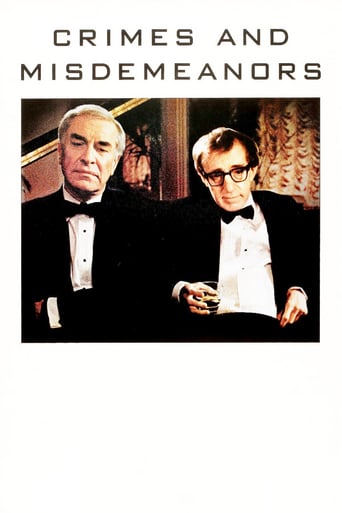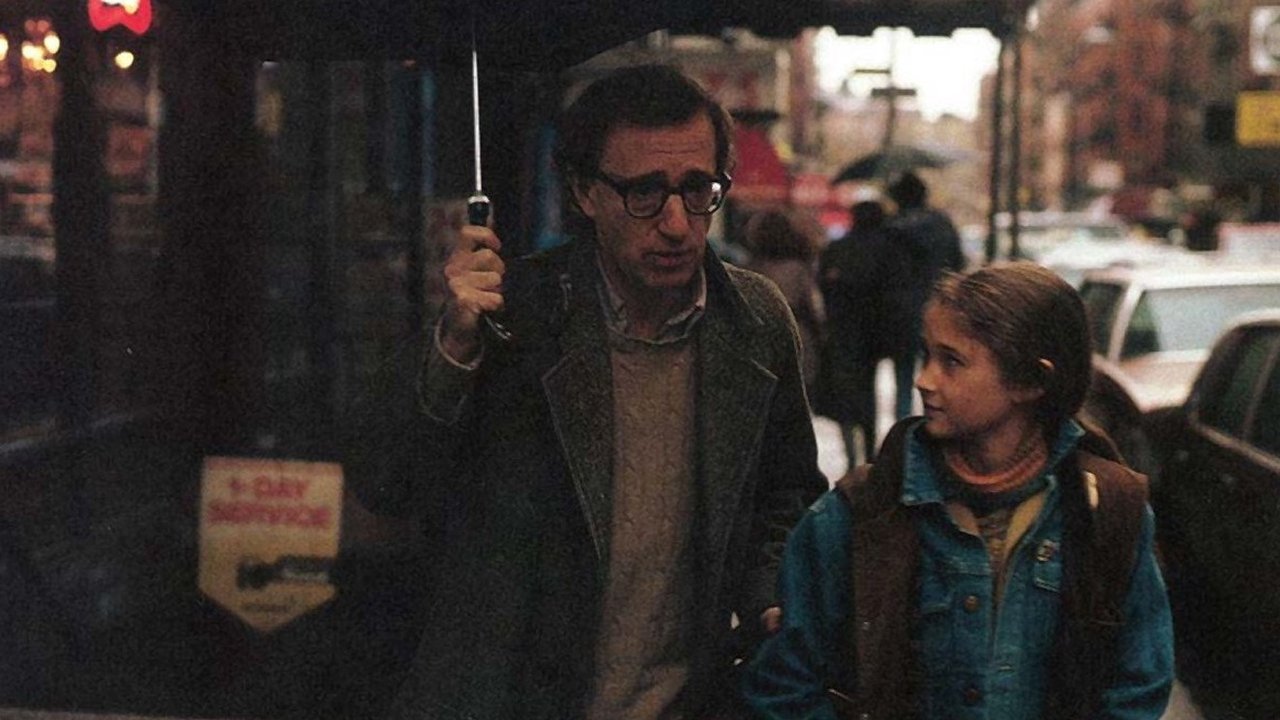suite92
The Three Acts:The initial tableaux: Ophthalmologist Judah is successful and respected. However, he's been having an affair with Dolores. Dolores wants to bring up the matter with Judah's wife Miriam, and clear the air. Judah would rather not.Cliff is a maker of small films who has little success. His wife Wendy speaks to her brother Lester, who is very successful in Hollywood. She convinces Lester to get Cliff a job filming a biography on Lester. Cliff takes the job in order to fund his own projects.Delineation of conflicts: Lester does not really want Cliff to direct his biography, but he does it as a favor to Wendy. Cliff does not want to do the piece, since he has no respect for Lester's pomposity. Cliff tries to connect with Halley, Lester's producer, in order to get additional funding for his documentary on Professor Levy. Filming Lester being Lester is a grand pain for Cliff.Judah wants to break up with Dolores, but Dolores has other ideas, which include seriously fouling up his personal and professional life. Jack suggests a solution to Judah's problem, but Judah has qualms. Ben, Judah's rabbi and patient, counsels him to take the higher road: let the meeting happen, let disclosure happen, keep a clear conscience. Dolores escalates, so what does Judah do?Resolution: Judah needs to solve his moral, financial, and personal dilemmas. Cliff needs to find his own success, and perhaps reignite his married life.
sharky_55
In one candid moment of the hugely successful Lester's life, he is given a rather rousing and instructive speech to a room full of colleagues, who listen intently, and the camera pans across until it finally reveals Cliff, aiming a different camera at the proceedings. Woody, and therefore Cliff, shoots this way because for him, there is no difference between Lester's real and documentary life; they are both shallow, worthless and rubbish. This is a departure from the usual Woody character - still neurotic, still high-minded and cultured, but this particular one is rather needy, somewhat pathetic. He prides himself on staying away from the Hollywood-esque success that Lester has garnered, and prefers more personal, meaningful works. One he is working on about an elderly philosopher who spouts vague truths about love and life blows up embarrassingly in his face when this wise man commits suicide. Lester openly insults his career by admitting he is only asking him as a favour to his sister, Cliff's wife. At the end of the film, Cliff feels like he deserves the love of Halley, another like-minded, smart and attractive individual (and he has been vicariously substituting this hollow in his life, in the wake of his waning marriage, with his young niece), and cannot even think why she would choose Lester over him (who reminds him of Mussolini). And so it haunts him endlessly. Dually, there is another closely linked with the family who is being haunted. Judah's affair is catching up with him, threatening both his personal and financial life, and there remains no choice. Landau is the best of the cast, and shows it here; watch how he tries to convince himself that the idea of the murder is not his idea, watch how he rambles endlessly about morality but cannot seem to remember why he called his brother for assistance. But for a crime of this magnitude, four months later he is seemingly at peace, while Cliff mourns newly. Crimes and Misdemeanors is not about how he got away with it - this is irrelevant and happens with ease - but how he deals with the fact he got away with it.Allen employs a few significant techniques to both these characters in moments of strife. The first is the silence, save for maybe the hum of a car engine or the crackling of a telephone, as the character's mind wanders incessantly on their troubles. This makes the music so much more dreadful when it finally cues in; in a particularly creepy sequence which follows the murderer, the previous lovers who found themselves together in Schubert now become confronted with death with his String Quartet 15, a moment of wonderful agitation without ever showing any action or violence. Another is the slow zoom in to a character's face as they are hit with horrible news, which is frequently coupled with the use of visual flashbacks which contrast the now cold and frightening reality. Levey's suicide, the murder of Paley...In one case Judah even consciously argues at length about morality with his memories of a Jewish dinner (this scene is very Allen) and this represents his full conscious awareness of his sin, and his desperation to justify it. Meanwhile, in a blow of cruel symbolism, the rabbi, the one moral centre, is blind by the end of the film, while the ophthalmologist is seeing clearer than ever. Another theme is the blurring of the boundaries between fiction and reality. We saw this first with Cliff shooting Lester, and also in the many cuts from reality straight into a movie that Cliff might be watching, which closely mirror the events of the story. Allen manages to conjure some of his humour from this tale; the hilarious way in which Mussolini is compared to Lester, the voyeuristic and aggressive manner that he films Lester flirting with the women in the workplace, and in one scene, the darkness of Judah's story almost invades into Cliff's. His sister is recounting a horrifying date incident, and we curl up in revulsion, waiting for that fateful word, before it is suddenly replaced with another. If it was rape Cliff might react with a subtle horror and rage, but in this case he flies off the handles and reacts with much more indignation than necessary, and it is very funny. Allen seems to readily announce that this is not a Hollywood movie. The ending is entirely pessimistic; the rich and successful Judah discovers the shakiness of the construct of humanity, and God's eye no longer plagues him, much less no longer exists in his mind. Cliff has let love slip away (then again, I think he deserves it, being wholly unoriginal, having his pet projects fail and even plagiarising a declaration of love from James Joyce's Ulysses). At times it feels like two completely separate films that have been combined as per title. But when they come together, and seem to exhibit the opposite reactions that we would normally expect, Levey's message rings true. But I don't think Cliff ever seems to realise it.
TheLittleSongbird
Woody Allen is not everybody's cup of tea, with me while his body of work is not always consistent(but that is true with a lot of directors) much of it is wittily written and insightful as seen with his masterpiece Annie Hall. Crimes and Misdemeanours has everything that is so good about the best of his work. With the subject matter and how the comedy and seriousness is blended Crimes and Misdemeanours is one of Allen's most ambitious, and along with the likes of Annie Hall, Hannah and Her Sisters, Husbands and Wives and Manhattan it's one of his best too. The look of the film is elegant and hauntingly dark, while the score is jazzy and seductive. The story has some key themes(good and evil and life and death as examples) that are very clearly addressed and dealt with with adroitness and truth. The concept is not an innovative one as such but it's challenging and hugely compelling. And the writing is to thank for that, the humour is wonderfully ironic and very characteristic of the distinctive wise-cracking Allen style, there are references and observations that are sharp and insightful(always one of Allen's strong points as a writer) and they is blended well with a serious tone that is dark and appropriately troubling, the shifts between comedy and drama didn't jar to me. The acting is very good, often outstanding. Woody Allen acts as well as directs and writes and there are no obvious problems with his performance(or his directing), not a likable character by all means but that was the intent. Anjelica Huston doesn't disappoint, nor does Jerry Orbach before his Law and Order days, Sam Waterson and Claire Bloom. Mia Farrow is affecting as well. But the acting honours go to Alan Alda and especially Martin Landau, Alda plays an absolute weasel to perfection while Landau gives a performance that has not only only been matched by his Bela Lugosi in Tim Burton's Ed Wood but also one of the greatest performances of any Woody Allen film. All in all, a Woody Allen classic, an example of ambitious done brilliantly. 10/10 Bethany Cox
lasttimeisaw
Another Woody Allen delight, a diptych of two moral conundrums, Laudau, a well-off ophthalmologist who ultimately gets away with the murder of his badgering mistress (Huston), meanwhile a frustrated documentary filmmaker (Allen) flunks to win his love interest (Farrow) over a pretentious showbiz magnate (Alda).For Laudau's story, one can easily sniff out the comparability of Allen's later London-based MATCH POINT (2005, 7/10), the other women are merely dispensable in favor of wealth, social status and ostensibly stable matrimony. In this film, its main concern is the struggle within, the general moral conscience Vs. the guilt or the sin, and out of left field, it is the latter eventually prevails, with the trappings of a comfortable life, the murder becomes a petty snippet in his memory and time can put everything back into an equilibrium, it is beyond any religion's absolution. Landau delivers one of his best performances in his lengthy career, an outright leading role (again, shamefully the category fraud push him into supporting group in the Oscar race), a hypocrite sleekly justifies his selfish and heinous behaviors with superfluous paddings, a despicable person so full of life with mocking caricature and a tint of self-reflection, everyone has his or her own unsurmountable hurdle in reality, luckily the preponderance is able to rein the yardstick. Anjelica Huston breaks her lofty stereotype, to overplay an unreasonable mistress who is too desperate to shore up her wanting sense of security, as vexing and halfwitted as she is, her denouement is too much a punishment. As for Allen's romantic entwinement with Farrow and his doomed marriage, it brims with casual wisecracks and addicted cinema-goings, but the scene-stealer is Alda, whose character is blatantly based on the late writer Larry Gelbart, utters bon mots like, comedy is tragedy plus time; or if it bends, it's funny, if it breaks, it isn't. He is snobbish and lewd to everyone's eyes, yet he walks off with Allen's soul mate. Woody Allen is rehashing the same old self, and Mia Farrow refrains herself as an out-of-his-league dame, who speaks highly about her unrealized ambition in order to reject a man trapped in a dead wedlock, yet subservient to the mogul's courtship, it all boils down to the point of a woman's self-deceptive blindness towards material needs, with a collateral damage to her unsuccessful suitor. So in both stories, the female characters are less glamorous and adorable here, not to mention Allen's sister's icky sex encounter in the bedroom. The film is mostly brisk under the accompany of a jazzy score, and its debate on moral structure is a cogent one and could be a reference to all the contemporary marital or relationship mishaps, even the religious mumble-jumble has an epiphany on those non-believers.


 AD
AD



